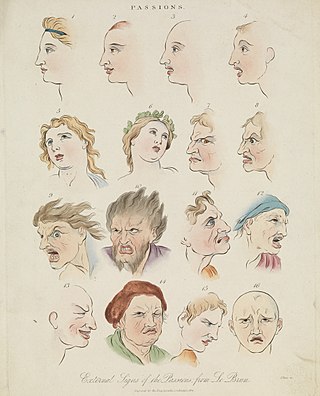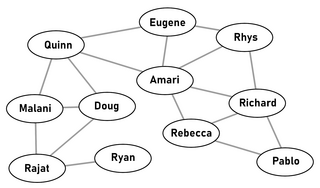
Emotions are physical and mental states brought on by neurophysiological changes, variously associated with thoughts, feelings, behavioral responses, and a degree of pleasure or displeasure. There is no scientific consensus on a definition. Emotions are often intertwined with mood, temperament, personality, disposition, or creativity.

Prejudice can be an affective feeling towards a person based on their perceived social group membership. The word is often used to refer to a preconceived evaluation or classification of another person based on that person's perceived personal characteristics, such as political affiliation, sex, gender, gender identity, beliefs, values, social class, friendship, age, disability, religion, sexuality, race, ethnicity, language, nationality, culture, complexion, beauty, height, body weight, occupation, wealth, education, criminality, sport-team affiliation, music tastes or other perceived characteristics.

A category of social psychology known as "crowd psychology" or "mob psychology" examines how the psychology of a group of people differs from the psychology of any one person within the group. The study of crowd psychology looks into the actions and thought processes of both the individual members of the crowd and of the crowd as a collective social entity. The behavior of a crowd is much influenced by deindividuation and by the person's impression of the universality of behavior, both of which conditions increase in magnitude with size of the crowd. Notable theorists in crowd psychology include Gustave Le Bon (1841-1931), Gabriel Tarde (1843-1904), and Sigmund Freud (1856-1939). Many of these theories are today tested or used to simulate crowd behaviors in normal or emergency situations. One of the main focuses in these simulation works aims to prevent crowd crushes and stampedes.

In the social sciences, a social group is defined as two or more people who interact with one another, share similar characteristics, and collectively have a sense of unity. Regardless, social groups come in a myriad of sizes and varieties. For example, a society can be viewed as a large social group. The system of behaviors and psychological processes occurring within a social group or between social groups is known as group dynamics.
Psychology is an academic and applied discipline involving the scientific study of human mental functions and behavior. Occasionally, in addition or opposition to employing the scientific method, it also relies on symbolic interpretation and critical analysis, although these traditions have tended to be less pronounced than in other social sciences, such as sociology. Psychologists study phenomena such as perception, cognition, emotion, personality, behavior, and interpersonal relationships. Some, especially depth psychologists, also study the unconscious mind.

An attitude "is a summary evaluation of an object of thought. An attitude object can be anything a person discriminates or holds in mind". Attitudes include beliefs (cognition), emotional responses (affect) and behavioral tendencies. In the classical definition an attitude is persistent, while in more contemporary conceptualizations, attitudes may vary depending upon situations, context, or moods.
Semiosis, or sign process, is any form of activity, conduct, or process that involves signs, including the production of meaning. A sign is anything that communicates a meaning, that is not the sign itself, to the interpreter of the sign. The meaning can be intentional such as a word uttered with a specific meaning, or unintentional, such as a symptom being a sign of a particular medical condition. Signs can communicate through any of the senses, visual, auditory, tactile, olfactory, or taste.
Ritualization refers to the process by which a sequence of non-communicating actions or an event is invested with cultural, social or religious significance. This definition emphasizes the transformation of everyday actions into rituals that carry deeper meaning within a cultural or religious context. Rituals are symbolic, repetitive, and often prescribed activities that hold religious or cultural significance for a certain group of people. They serve various purposes: promoting social solidarity by expressing shared values, facilitating the transmission of cultural knowledge and regulating emotions.
The term new social movements (NSMs) is a theory of social movements that attempts to explain the plethora of new movements that have come up in various western societies roughly since the mid-1960s which are claimed to depart significantly from the conventional social movement paradigm.
Collective consciousness, collective conscience, or collective conscious is the set of shared beliefs, ideas, and moral attitudes which operate as a unifying force within society. In general, it does not refer to the specifically moral conscience, but to a shared understanding of social norms.
Self-knowledge is a term used in psychology to describe the information that an individual draws upon when finding answers to the questions "What am I like?" and "Who am I?".

Social movement theory is an interdisciplinary study within the social sciences that generally seeks to explain why social mobilization occurs, the forms under which it manifests, as well as potential social, cultural, political, and economic consequences, such as the creation and functioning of social movements.
Dissociative amnesia or psychogenic amnesia is a dissociative disorder "characterized by retrospectively reported memory gaps. These gaps involve an inability to recall personal information, usually of a traumatic or stressful nature." The concept is scientifically controversial and remains disputed.

In sociology, social psychology studies the relationship between the individual and society. Although studying many of the same substantive topics as its counterpart in the field of psychology, sociological social psychology places relatively more emphasis on the influence of social structure and culture on individual outcomes, such as personality, behavior, and one's position in social hierarchies. Researchers broadly focus on higher levels of analysis, directing attention mainly to groups and the arrangement of relationships among people. This subfield of sociology is broadly recognized as having three major perspectives: Symbolic interactionism, social structure and personality, and structural social psychology.
Identity formation, also called identity development or identity construction, is a complex process in which humans develop a clear and unique view of themselves and of their identity.

Entrainment in the biomusicological sense refers to the synchronization of organisms to an external perceived rhythm such as human music and dance. Humans are the only species for which all individuals experience entrainment, although there are documented examples of entrained nonhuman individuals.
Seriality or serial collectivity is a term that feminist scholar Iris Marion Young used to describe a reconceptualization of the category of woman in her 1994 essay Gender as Seriality. Young borrows the concept of seriality from Sartre's Critique of Dialectical Reason, where he originally developed the idea to describe the relationship of individuals to social classes and the capitalist system of production and consumption. Understanding women as a series, rather than a group, entails the recognition that the category woman is not defined by any common biological or psychological characteristics; rather, individuals are positioned as woman by a set of material and immaterial social constructs that are the product of previous human actions.
James Macdonald Jasper is a writer and sociologist who has taught Ph.D. students at the Graduate Center of the City University of New York since 2007. He is best known for his research and theories about culture and politics, especially the cultural and emotional dimensions of protest movements.
Text and conversation is a theory in the field of organizational communication illustrating how communication makes up an organization. In the theory's simplest explanation, an organization is created and defined by communication. Communication "is" the organization and the organization exists because communication takes place. The theory is built on the notion, an organization is not seen as a physical unit holding communication. Text and conversation theory puts communication processes at the heart of organizational communication and postulates, an organization doesn't contain communication as a "causal influence", but is formed by the communication within. This theory is not intended for direct application, but rather to explain how communication exists. The theory provides a framework for better understanding organizational communication.
Intersectional solidarity involves the collaborative efforts and mutual support of individuals and groups facing intersecting forms of marginalization and oppression. This approach highlights the importance of recognizing and addressing the interconnections between various social identities, such as race, gender, class, sexuality, and ability. By recognizing these intersections, intersectional solidarity seeks to foster unity and collaborative action that is inclusive and fair, thereby supporting a holistic approach to social justice movements.







